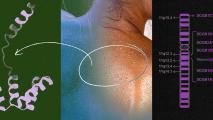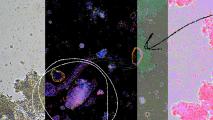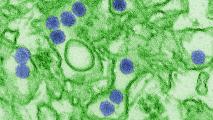Cancer researchers are looking to harness the echoes of ancient viruses, buried in humans’ evolutionary past, to fight prostate cancer.
Here’s how it works: By reactivating snippets of viruses’ genetic code left in human DNA during ancient infections, Charles Spruck and his colleagues at Sanford Burnham Prebys can trick the immune system into thinking cancer cells are viruses — a nifty trick known as “viral mimicry.”
“In viral mimicry, the body thinks there’s an infection, which kicks the immune system into high gear,” Spruck said.
“With the immune system activated, cancer cells are more responsive to treatment, and tumor growth slows. All of this can happen without triggering treatment resistance, which could be a huge benefit for treating prostate cancer.”
The American Cancer Society estimates there will be 288,300 new cases of prostate cancer in 2023 and around 35,000 deaths. It is one of the most common forms of cancer in men, second only to skin cancer.
While not ready to enter clinical trials yet, the Department of Defense has awarded Spruck’s lab a $1.7 million dollar grant to help develop the treatment.
Researchers want to use the genetic remnants of ancient viral infections to fight cancer.
Ancient viruses: Retroviruses — including HIV — replicate by inserting their genetic code directly into the DNA of a cell. If the infection doesn’t kill the cell outright, when that cell divides, it will copy the virus’s DNA along with it.
In rare cases, if a retrovirus manages to infect a sperm or egg, this viral DNA can become a permanent part of the human genome, being passed on from generation to generation (assuming it doesn’t kill the person). Such viral DNA generally becomes a silent, inactive feature of the genome.
These scattered remnants of ancient infections are called endogenous retroviruses, and the human genome is littered with them — a common estimate is that 8% of human DNA originates from these viruses. Some endogenous retroviruses are a curse, being linked to cancers and autoimmune diseases; others are a gift, being repurposed by evolution and affecting crucial human abilities — including how we give birth.
In general, though, endogenous retroviruses “are inactive, so they don’t produce proteins the way regular genes do,” Spruck said, and they do not usually make us sick.
But, even after millions of years, they can be reawakened.
Activating the old genes in cancer cells tricks the immune system into thinking they are viruses to attack — a technique known as viral mimicry.
A new therapy: Spruck’s team found that reactivating these ancient endogenous retroviruses in cancer cells will cause the immune system to attack them. To wake up the inactive viral DNA, they interfered with an enzyme that ordinarily helps the cell repress these endogenous retroviruses, Spruck told Freethink. With that enzyme held back, the viral DNA reawakens, triggering the immune system to attack.
This immune response could work as a therapy in and of itself, or be combined with other forms of treatment to weaken the cancer and prevent it from becoming resistant.
The team first developed their viral mimicry technique to fight breast cancer, and suspected it may work in other treatment-resistant forms of cancer, including in the prostate.
“Many cases of prostate cancer are treatable, so people don’t think of it as a major public health issue,” Spruck said. “But when prostate cancer becomes metastatic or resistant to therapy—such as hormone therapy—it can ultimately become a fatal disease. One of the benefits of this approach is that it works in a completely different way, so it’s not as susceptible to resistance.”
“Something very exciting about this work is that it has the potential to move to the clinic extremely quickly. We hope to have a drug ready for the clinic within three years.”
Charles Spruck
Future work: A drug that can reactivate endogenous retroviruses in prostate cancers has already been discovered by Spruck’s lab, GEN reported, but there’s a catch: it’s not currently selective enough, or potent enough, for use in people. As it stands, the drug would require too large a dose for clinical studies in humans, and it also inhibits other important enzymes in the same class as the ones repressing the endogenous retroviruses.
“Both these properties could lead to unwanted side effects for patients,” Spruck tells Freethink. “We are currently developing new drugs with the required potency and selectivity to treat prostate cancer patients in the clinic.”
One of the team’s goals is to develop compounds capable of sparking viral mimicry, laying the groundwork for prostate cancer therapy.
“Something very exciting about this work is that it has the potential to move to the clinic extremely quickly,” Spruck said. “We hope to have a drug ready for the clinic within three years.”
We’d love to hear from you! If you have a comment about this article or if you have a tip for a future Freethink story, please email us at [email protected].






